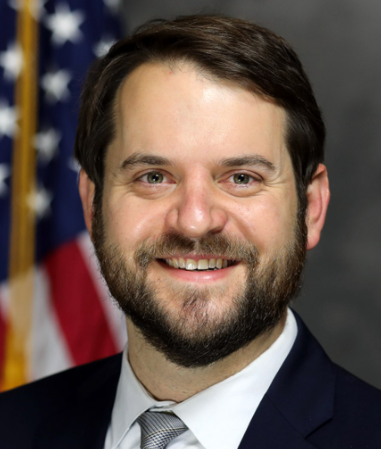Editor’s note: As part of Xpress‘ monthlong Sustainability Series, we reached out to all candidates running for Buncombe County Board of Commissioners as well as Asheville City Council. Conversations with those who participated will appear throughout our four April issues.
Buncombe County Commissioner Parker Sloan will run in an uncontested race for this District 3 seat. Sloan, a Democrat, joined the Buncombe County Board of Commissioners in 2020 and serves as chair of the newly formed Buncombe County Climate and Environment Committee.
The Buncombe County Board of Commissioners meets on the first and third Tuesday of each month. Commissioners vote on policies related to property taxes, zoning, education and more.
Xpress: What misconceptions do community members have about the role of the Buncombe County Board of Commissioners?
Sloan: If I could explain and educate people about one thing regarding local government in North Carolina, it is that the primary source of funding for everything (schools, emergency services, infrastructure, housing, etc.) is property taxes. Many types of local government in other states have layers of other funding for these same things. Meanwhile, the N.C. General Assembly is defunding the state and paying for less and less, leaving the funding up to local governments.
What can local leaders do to promote thoughtful community dialogue about complex and difficult topics such as the opioid crisis, crime, housing and health care?
Housing scarcity is our biggest economic challenge, and the evidence tells me that it is almost exclusively a supply-and-demand problem. There’s a lot of focus on the overall cost of living and the impact of the significant growth our community is seeing from people of means from out of state. What is, however, more important and more in our control is housing supply.
Housing scarcity is a problem from which so many of our other issues come from. It is tied to the existence of the unhoused, the inability of employers to attract and hire enough workers, and the growth of unsustainable suburbs. All of which cost us.
I want to promote a communitywide dialogue with groups like Strong Towns in order to identify where we can grow our housing stock and embrace urbanism without displacing people from neighborhoods.
What can the city and county do to help small businesses thrive?
To me, what the government can do to help businesses thrive is to create a community with a diverse economy, good schools, pre-K access, more housing and good amenities. A place that is not just for tourists or wealthy people from out of state, but a place for everyone. A place that naturally recruits people to live, work and stay here and feel capable of raising a family here. City and county governments both have a tremendous amount of work to do to show this community that we actually want these things. Two ways Buncombe County is working on this every day is through our early childhood education programming and our increasing commitment to fund affordable housing, including building it on public land.
In your opinion, is it sustainable to operate two school districts? Why or why not?
Both our school systems are fantastic, and I don’t think their accomplishments are highlighted enough in community dialogue. The staff and teachers show up every day ready to change lives and make our student experience the best it can be. If you follow their news releases or social media, you can see that [these schools] are places of immense creativity, student support and academic achievement.
I’m very interested to see the merger study results, hear the community input and understand what might be gained from a merger. ACS is very small; I do not believe that a merger would result in the significant financial savings some seem to think it will.
Our local school systems are facing an enrollment crisis that is impacting their budgets. The General Assembly is actively working to neglect public education with punitive budgets, eliminating the cap on the quantity of charter schools in our community, not giving adequate teacher raises and encouraging school choice vouchers. This has had dire budgetary consequences on all public schools in North Carolina.
For this reason, I think one of the biggest questions facing the people of this county in the next decade will be: Do we continue to wait on the N.C. General Assembly to fund education appropriately, or do we (using primarily property taxes) do more ourselves for our own children and their future?
To learn more about Sloan, visit avl.mx/dij.




Before you comment
The comments section is here to provide a platform for civil dialogue on the issues we face together as a local community. Xpress is committed to offering this platform for all voices, but when the tone of the discussion gets nasty or strays off topic, we believe many people choose not to participate. Xpress editors are determined to moderate comments to ensure a constructive interchange is maintained. All comments judged not to be in keeping with the spirit of civil discourse will be removed and repeat violators will be banned. See here for our terms of service. Thank you for being part of this effort to promote respectful discussion.